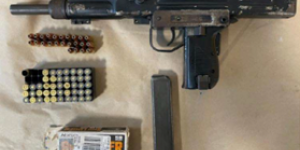Press Release
Member of Violent Gang Pleads Guilty to Racketeering Involving Attempted Murder
For Immediate Release
U.S. Attorney's Office, District of Massachusetts
BOSTON – A Boston-area man pleaded guilty today to his role in Cameron Street, a violent Boston gang.
Daronde Bethea, a/k/a “Freeze,” 32, of Boston and Brockton, pleaded guilty today to conspiracy to participate in a racketeering enterprise, more commonly known as RICO conspiracy; conspiracy to interfere with commerce by force or violence; and being a felon in possession of a firearm and ammunition. U.S. Senior District Court Judge William G. Young scheduled sentencing for May 16, 2024. Bethea was indicted by a federal grand jury in December 2022.
Bethea was identified as a member of Cameron Street, a violent gang based largely in the Dorchester section of Boston. According to court documents, Cameron Street members use violence, including murder and attempted murder, to preserve, protect and expand its territory. They allegedly use social media to promote Cameron Street, celebrate murders and other violent crimes, and denigrate rival gangs. They allegedly possess, carry and use firearms; distribute controlled substances; commit armed robberies; and engage in human trafficking in part to generate income.
As part of his role in the Cameron Street enterprise, Bethea committed an attempted murder with a firearm of a rival gang member in Dorchester in June 2018. As the victim got into his car, Bethea shot the victim multiple times causing the victim to have a collapsed lung. In addition, Bethea was involved in two violent home invasion robberies – in November 2017 in Dorchester and July 2018 in Canton. During a chase from the Canton home, Bethea was captured on a police cruiser camera possessing a loaded handgun that was later recovered.


The charge of RICO conspiracy and conspiracy to interfere with commerce by force or violence each provide for a sentence of up to 20 years in prison, three years of supervised release and a fine of $250,000. The charge of being a felon in possession of a firearm and ammunition provides for a sentence of up to 10 years in prison, three years of supervised release and a fine of $250,000. Sentences are imposed by a federal district court judge based upon the U.S. Sentencing Guidelines and statutes which govern the determination of a sentence in a criminal case.
Acting United States Attorney Joshua S. Levy; James M. Ferguson, Special Agent in Charge of the Bureau of Alcohol, Tobacco, Firearms & Explosives, Boston Field Division; Brian D. Boyle, Special Agent in Charge of the Drug Enforcement Administration, New England Field Division; and Boston Police Commissioner Michael Cox made the announcement today. Valuable assistance was provided by the Massachusetts State Police; Suffolk County Sheriff’s Office; Suffolk, Plymouth, Norfolk and Bristol County District Attorney’s Offices; and the Canton, Quincy, Randolph, Somerville, Brockton, Malden, Stoughton, Rehoboth and Pawtucket (R.I.) Police Departments. Assistant U.S. Attorneys Christopher Pohl and Charles Dell’Anno of the Criminal Division are prosecuting the case.
This operation is part of an Organized Crime Drug Enforcement Task Forces (OCDETF) Strike Force Initiative, which provides for the establishment of permanent multi-agency task force teams that work side-by-side in the same location. This co-located model enables agents from different agencies to collaborate on intelligence-driven, multi-jurisdictional operations to disrupt and dismantle the most significant drug traffickers, money launderers, gangs, and transnational criminal organizations. OCDETF identifies, disrupts, and dismantles the highest-level criminal organizations that threaten the United States using a prosecutor-led, intelligence-driven, multi-agency approach. Additional information about the OCDETF Program can be found at https://www.justice.gov/OCDETF.
The details contained in the charging document are allegations. The remaining defendants named in the indictment are presumed innocent unless and until proven guilty beyond a reasonable doubt in a court of law.
Updated February 12, 2024
Topics
Firearms Offenses
Violent Crime
Component

 U.S. Department
of Justice
U.S. Department
of Justice

